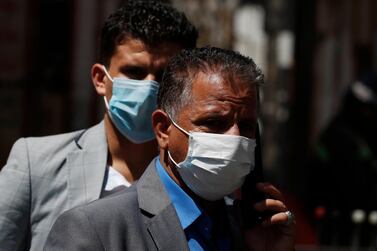Talks on a Yemen ceasefire to help prevent the spread of novel coronavirus could be completed soon, UN special envoy Martin Griffiths said on Thursday,.
Mr Griffiths is pushing for an end to the conflict between Yemen’s internationally recognised government and Houthi rebels that started five years ago. The envoy led the last round of peace talks more than a year ago in Sweden. An agreement was reached on a ceasefire in the port city of Hodeidah and a prisoner exchange but hostilities and mistrust stalled the process.
However, Saudi Arabia, which is leading a coalition fighting the Houthis on behalf of the government, said it had invited the Iran-backed rebels to Riyadh for direct talks.
“‘I hope that these consultations can be soon completed and deliver what Yemenis expect, demand and deserve,” Mr Griffiths said.
A statement by the envoy's office said it was “discussing concrete steps with the parties and remains in regular contact with them” to bring about agreements on a nationwide ceasefire, and on humanitarian and economic measures to ease the suffering of Yemenis.
Mr Griffiths is conducting daily consultations “with the aim of convening virtually the parties together soonest possible,” the statement said.
It also called for a resumption of the political process to end the war.
The US Secretary of State Mike Pompeo backed efforts to ease tensions between Yemen's warring sides during a phone call with the Saudi Foreign Minister, Prince Faisal bin Farhan, on Wednesday.
“The secretary and the foreign minister discussed the conflict in Yemen and agreed that only a political solution would bring about stability, peace, and prosperity," Morgan Ortagus, spokeswoman for the US State Department, said.
"The secretary and the foreign minister agreed that an unstable Yemen only benefits the Iranian regime and that the regime’s destabilising behaviour there must be countered," she said.
“The secretary underscored that the United States would continue to support Saudi Arabia in the face of Iran’s threatening behaviour.”
Saudi Arabia's ambassador to Yemen, Mohammed Al Jaber, told The Wall Street Journal this week that Riyadh had been in direct talks with the rebels since last September and invited them to the kingdom.
The invitation for talks in the country were “undertaken at the request” of the UN envoy, Mr Al Jaber said.
Saudi Arabia said it intercepted two ballistic missiles aimed at Riyadh and Jizan at the weekend, part of a drone and missile attack by the Iran-backed rebels.
The US, UK and regional states condemned the Houthis’ attacks on civilian targets in the kingdom.
In response, the Saudi-led Arab Coalition launched strikes on Monday against rebel military bases in Sanaa.
But Mr Al Jaber confirmed that talks are still on the table.
He said the coalition strikes were not intended to cause a flare-up in hostilities but were in response to the rebels’ missile attacks.
“We are committed to our de-escalation,” Mr Al Jaber said.
“We are ready to have a ceasefire in all Yemeni territory if they accept it.”
Yemen’s government on Wednesday released hundreds of prisoners charged with lesser crimes amid fears that the coronavirus could spread through the country’s jails.
"More than 470 prisoners were freed from detention facilities in provinces under the legitimate government's control, such as Dhalea, Al Mahra, Hadramawt, Shabwa, Marib and Taez," a judiciary source told The National.







